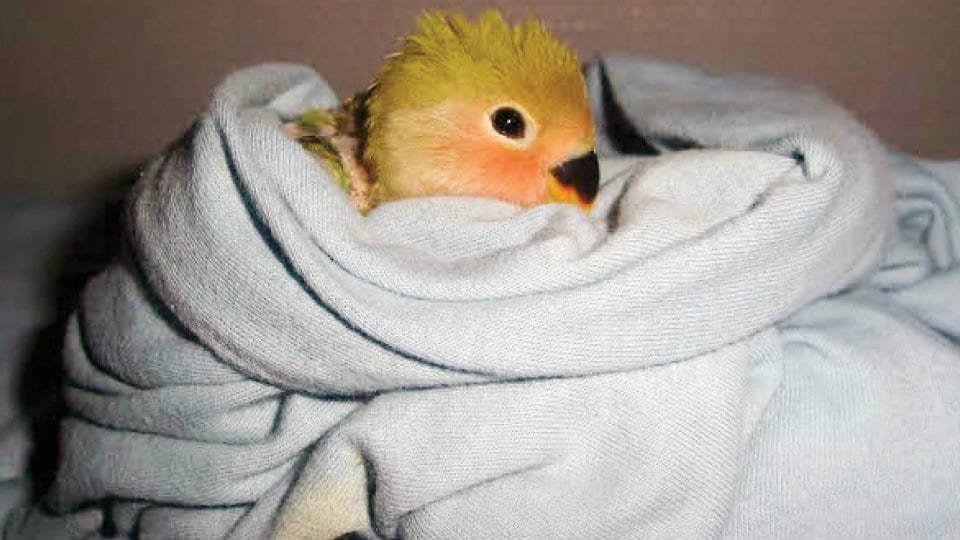In this week’s Pet Talk, Maneka gives tips on how to keep a rescued bird warm at night?
By Maneka Gandhi
My cat is using the area outside of the litter box. This has never happened before. Why is it happening and what should I do?
These common litter box problems could be repelling your cat: An unclean litter box. Too few litter boxes for the cats in the household. A cramped litter box. A litter box with a hood or liner. A litter box with sides that are high. Too much litter in the box. An uncomfortable location that doesn’t allow for privacy and multiple escape routes. A change in the kind of litter you use.
Negative associations. Your cat may have been upset while using the box. She may also connect the box with painful elimination, even if her health is back to normal.
Stressors, like moving, adding new animals or family members to the household. A conflict with another cat in the household. A new preference for eliminating on certain surfaces or textures — like carpet, potting soil, or bedding.
Common medical conditions, which may affect litter box use, include: Urinary Tract Infection (UTI). If your cat frequently enters her litter box but produces small amounts of urine, she may have a UTI.
Feline Idiopathic Cystitis (FIC). FIC is a complex disease that causes inflammation of the bladder. It can cause a cat to eliminate outside the litter box because of the urgency to urinate.
Bladder stones or blockage. If your cat has bladder stones, or a blockage, she may frequently enter her litter box. She may also experience pain and mew or cry when she tries to eliminate. Her abdomen may be tender to the touch.
If your veterinarian has ruled out a health problem, you can make a few changes to see if you can steer your cat back to the litter box: Scoop and change your cat’s litter at least once a day. Thoroughly rinse out the box with baking soda, or unscented soap, once a week. Use less litter. Cats like a shallow bed of litter — not more than two inches deep. Use a larger litter box. Use clumping, unscented litter of a medium to fine texture, or the litter she used as a kitten. You could try putting a few clean boxes side by side, each with a different type of litter, to see which one your cat prefers.
I rescued a bird. How do I keep my rescued bird warm at night?
Move the cage away from doors and windows. Birds, that are positioned near doors and windows, are at risk of being exposed to icy drafts. Move your pet to an interior location to prevent the chills.
Consider covering the cage at night. Using a cage cover, after the sun goes down, can work wonders for helping to maintain a comfortable temperature within your bird’s environment.
Try temporary insulation. Seal off windows and unused doorways with a shrink wrap insulation kit. It will not only help keep cold air out, it will keep the warm air in.
Use caution when heating. Wood burning fireplaces, as well as both kerosene and electric space heaters, can pose a threat to your pet’s health. The smoke and fumes from the wood and gas can wreak havoc on a bird’s respiratory system, and many electric heaters contain non-stick coating, which is notorious for causing birds acute illness and death. Smoking has the same effect.
Monitor closely for signs of exposure. A chilled bird is a bird with a lowered immune system.
My older pet is exhibiting changes in behaviour. What’s going on?
Before any medical signs become apparent, behavioural changes can serve as important indicators that something is changing in an older pet, which may be due to medical or other reasons. As the owner of your pet, you serve a critical role in detecting early signs of disease, because you interact and care for your pet on a daily basis and are familiar with your pet’s behaviour and routines. If your pet is showing any change in behaviour, or other warning signs of disease, contact your veterinarian and provide him with a list of the changes you have observed in your pet. Sometimes the changes may seem contradictory — such as an older pet that has symptoms of hearing loss but also seems more sensitive to strange sounds.
Possible behaviour changes in older pets: Increased reaction to sounds. Increased vocalisation. Confusion. Disorientation. Decreased interaction with humans. Increased irritability. Decreased response to commands. Increased aggressive/ protective behaviour. Increased anxiety. House soiling. Decreased self-hygiene/ grooming. Repetitive activity. Increased wandering. Change in sleep cycles.
What should I think about when deciding to travel with my pet?
There are numerous considerations you should take into account: Make sure your pet is comfortable with travel. Some pets cannot handle travel because of illness, injury, age or temperament. If your pet is not good with travel, you should consider a reliable pet-sitter, or talk to your veterinarian about boarding facilities in your area. Make sure your pet has identification tags with up-to-date information.
Having your pet implanted with a microchip can improve your chances of getting your pet back if it becomes lost. The microchip must be registered with your current contact information, including a cell phone number.
If you are taking your pet across State or international borders, a health certificate, as well as other documentation, may be required. The health certificate must be signed by an accredited veterinarian after examining your pet and determining that it is free of infectious diseases and satisfies all import requirements of the receiving State, territory, or country.
Make sure that your pet is allowed where you are staying. Some accommodations will allow pets and some will not, so check in advance. Also, when travelling, you should bring a portable kennel with you if you have to leave your pet unattended.
Staying with Friends or Family: Inform your host that your pet will be coming along, and make sure that your pet is a welcomed guest as well.
Staying in a Hotel or Motel: Stay at a pet friendly place. Some hotels and motels only accept small pets, or pets under a certain weight. When making a reservation, make sure you inquire about the terms of their pet policy. Try to minimise the amount of time your pet will be alone in the room. When leaving your pet alone in the room, inform the front desk that your pet is being left alone in the room and place a “Do Not Disturb” sign on the door. Make sure the hotel/ motel knows how they can contact you if there are any problems.
My rabbits are 8 weeks old so at what age should I limit rabbit’s pellet intake?
The recommended daily serving of pellets for rabbits by weight: • 1-4 lbs = 1/8 cup daily; • 4-8 lbs = 1/4-1/3 cup daily; • 8-10 lbs = 1/3-1/2 cup daily; • 10 lbs+ = 3/4 cup daily.
The thing to remember is that pellets are intended essentially as a supplement to a healthy rabbit’s base diet of hay and green vegetables, to give them nutrients not easily obtained from those other sources. Hay should always be the chief component of your rabbit’s daily provender.
Someone has poisoned the stray animals in our residential area. What should I do?
This comes under Section 428 and 429 of the Indian Penal Code (IPC) and is a punishable offence. Gather photographic evidence and witness statements, and register a complaint in your local Police Station under the aforementioned IPC. Also, get the post-mortem of the dead-bodies done in order to make your case strong. In your FIR, specifically mention the names of the persons who were involved in the killing/ poisoning, along with date, time, description of bodies, etc. Thereafter, it is the responsibility of the police to conduct investigation.
If the animal is alive, first take the animal to the closest vet and get him/ her treated. And contact the nearest animal shelters to ensure the animal is taken care of.








Recent Comments